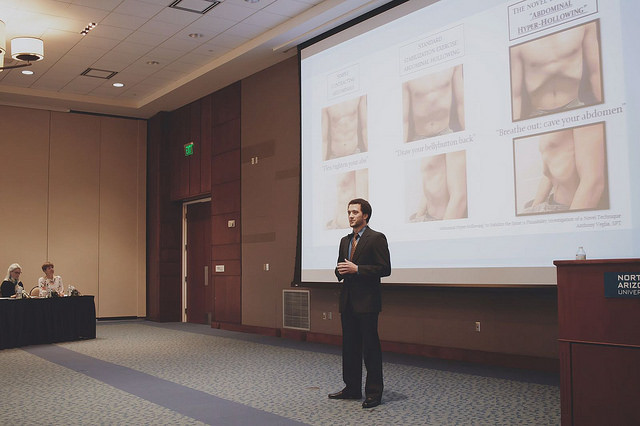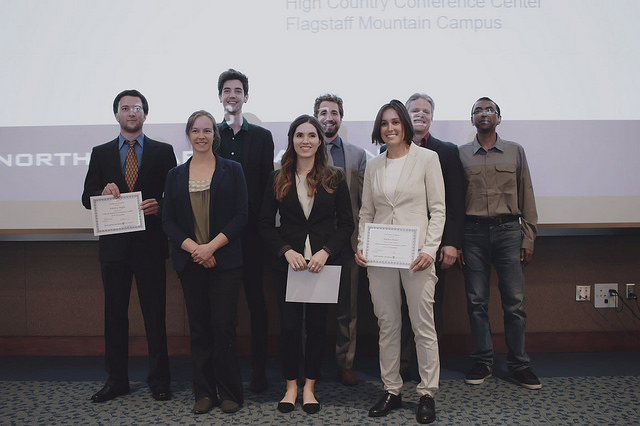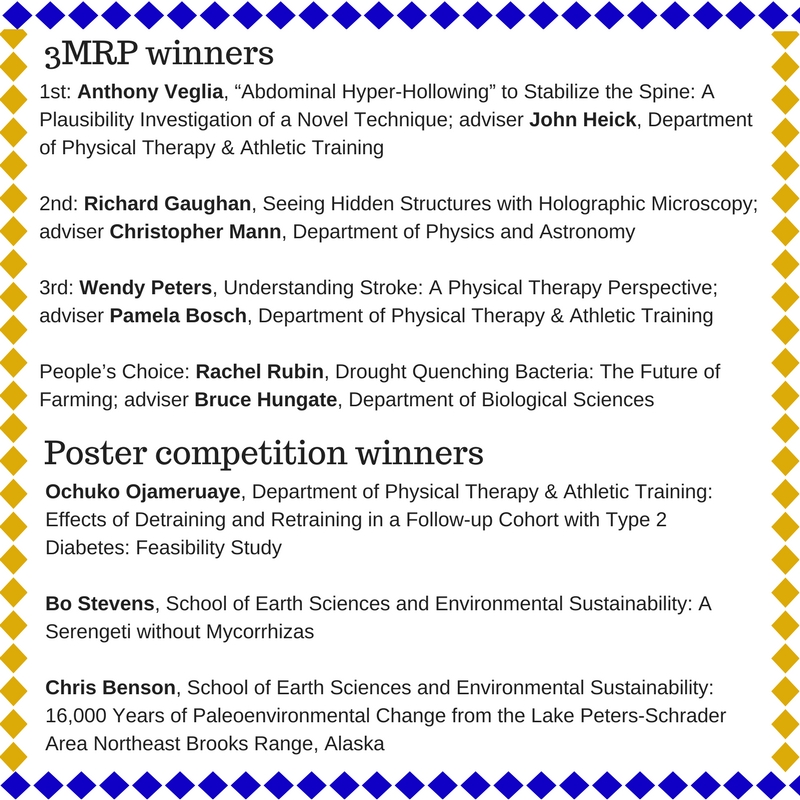By Heidi Toth
NAU Communications
Anthony Veglia had only three minutes to explain his technical research, so he started with two words to which most people in the room could relate: back pain.
Veglia, a physical therapy doctoral student at Northern Arizona University, focused on how prevalent and debilitating back pain can be: 70 to 85 percent of American adults will experience it in their lifetimes. It accounts for one-eighth of all sick days. It’s the second most common reason to go to the doctor and third most common reason for surgery.
“For the physical therapy profession, that’s unacceptable,” he said.
For the next two minutes, he discussed how a breathing technique called abdominal hyper-hollowing, which he learned in Brazilian Jiu Jitsu, could be used as a spine stabilizer for people who suffered from back pain. His study found people using this technique reported less pain. He cracked a joke or two, earning a laugh from the audience. Then, less than five minutes after he got up, he was back in his seat.
That’s exactly how the Three Minute Research Presentations (3MRP) work. Graduate students distill their thesis or dissertation, which is often hundreds of pages long, representing years of work and written in the technical language of their research, into 180 seconds in front of a lay audience.
At NAU’s fifth annual 3MRP finals, held Tuesday at the High Country Conference Center, Veglia walked away with the $3,000 grand prize, as well as the opportunity to compete at the statewide competition in April.
Both President Rita Cheng and Graduate College Dean Maribeth Watwood congratulated the students that made it to finals as well as the students who were in the preliminary rounds and who are continuing to work on their research for presentation in future years.
“We have impressive research going on across campus and impressive graduate students who are engaged in that research with our faculty,” Cheng said. “You’re in the right place at the right time.”
Watwood also pointed out the importance of effectively communicating research, a skill that can get overlooked in the lab or the field. Distilling their work into conversation prepares these researchers to have an even greater impact.
“You can do the top research, but if you can’t explain it to someone who’s not in your field, that work becomes extremely limited,” she said.
The judges for the final were theatre professor Benjamin Alexander; Gore project change adoption specialist Allison Bates Caputo; Vice Provost Laurie Dickson; College of Education Dean Ramona Mellott; General Counsel Michelle Parker; Vice President of Research David Schultz; and Veteran and Military Services director Peter Yanka. The Graduate Student Government also held a poster competition in conjunction with the event, announcing the top three winners between presenters.
NAU News spoke to Veglia about his research and what it felt like to win.

How did the idea for the research develop?
I learned the novel abdominal strengthening technique by watching Rickson Gracie (a legendary, and personal favorite, martial artist) in the documentary “Choke.” I believe I was still in high school when I learned the technique. Simply put, I was just very curious about the actual mechanics of what my body was doing and capable of, especially after learning of the standard technique used in physical therapy practice. From that question to my professor, John Heick, a capstone research project was born and we are now beginning our trials.
Where are you from? When do you graduate?
I was born and raised in Gilbert and have been attending NAU for undergraduate and my doctoral program. I will actually have said doctorate in December as my clinical rotations come to an end.
You had a brain aneurysm when you were younger. Did this influence your research at all?
While there was a finalist doing research on brain aneurysms, I was ironically not the one conducting it! That incident definitely cemented my already existing desire to enter physical therapy, and I now absolutely want to pursue neurological physical therapy in order to help those who have similar experiences in their lives and want to return to their previous function.
How did it feel to win?
I had half-jokingly told my friends that my plan was just to win first place and not have to worry about what I could have done better, but to actually hear my name announced as the champion of the event was a bit surreal. I definitely feel that I put the work in, but I am immensely grateful as well. I really cannot express how blessed I feel or how excited I am that two physical therapy students placed. Wendy Peters did amazingly and more than deserved her third place victory as well!
Any tips for future presenters on how to present difficult research quickly and in easy-to-understand language?
Stick to the interesting, limit the jargon and avoid the technical. You don’t have to teach the audience how to do research, you need to entertain them and express why your topic matters. Also, if you’ve never taken a theatre class, consider it; I enjoyed several in high school and it certainly helped me present.




